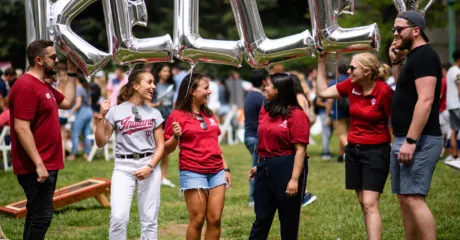The Marriott School of Business at Brigham Young University landed at No. 31 in this year’s rankings. The Utah-based B-school improved by 61 ranks from last year’s 92 spot, however, that placement was because BYU did not meet the minimum alumni response rate and consequently missed the entire academic experience category. In 2019, the Marriott School ranked No. 35, which is closer to where it’s been ranked most years, including this one.
Marriott had a much more selective admissions process this year with an acceptance rate of 50.69% and average SAT score of 1224, compared to last year’s acceptance rate of 81% and average SAT score of 1115. The B-school also received high remarks from surveyed alumni, who gave a 9.7 average rating for their degree’s value. Overall, the school did best in the Academic Experience category, placing No. 27 overall. The school did consistently well across the other two methodological categories, placing No. 35 in Admissions Standards and No. 37 in Career Outcomes.
The Marriott School of Business offers an education that emphasizes ethical decision making and gives students opportunities to gain valuable experience that translates to high employability.
ETHICS-FOCUSED CURRICULUM
As an institution owned by The Church of Jesus Christ of Latter-day Saints, BYU as a whole emphasizes ethical decision-making in its education. And at Marriott, those values are apparent in the undergraduate business curriculum.
Students can choose from 10 majors including Accounting, Business Management, Entrepreneurial Management, Experience Design and Management, Finance, Global Supply Chain Management, Human Resource Management, Information Systems, Marketing, and Strategic Management.
Like many other B-schools, Marriott’s core business courses feature foundational topics based on a student’s chosen major. However, at Marriott, that core curriculum also includes an “Ethics for Management” course that all Marriott students — regardless of major — must take.
Marriott alumni have a positive outlook on the quality of their education. When asked to rate the quality of teaching in Marriott business courses, 2018 alumni gave a strong 9.2 average rating. Additionally, alumni rated Marriott faculty availability for informal discussions and mentoring outside of class at a 9.1 average rating.
“I truly gained first-hand experience with these professors and can attest to their quality and sincerity,” one 2018 alumni told us. “They are some of the sharpest in their fields, and chose to be at BYU.”
VALUABLE WORK EXPERIENCE
Roughly 62% of surveyed 2018 alumni say they engaged in some sort of “signature experience” during their time at Marriott that was key to their business learning. At Marriott, students have access to a number of opportunities to gain real work experience from on-campus internships and case competitions to capstone projects.
On-campus internships are student-led 15-week projects that are sponsored by a wide-range of companies. Students receive academic credit for their on-campus internships and also gain valuable real work experience in their chosen fields. One 2018 alumni referenced the significance of her on-campus internship with PwC.
“It helped land me my full-time junior summer internship and then ultimately my full-time job after graduation,” she said.
Marriott students also have access to a number of case competitions that give them an opportunity to showcase their knowledge and skills.
“I participated in 8 case competitions on a national scale,” one 2018 alumni said. “They were probably the closest approximation to work life that I experienced in my undergrad. I felt the stress and pressure to perform that you feel so often in the workplace. They were also significant accelerators to my knowledge base, as I had to diligently work to find answers to pressing questions.”
Aside from on-campus internships and case competitions, the courses at Marriott often require students to apply their studies to real-world situations.
“For example in my economics of strategy course, each group identified a local business to analyze and actually provide suggestions based on the concepts we learned in class,” another 2018 grad said. “It cemented the concepts which I now apply in my employment.”
“Our final project was to find an actual product/service and to rebrand it,” one 2018 alumni told us. “So our team picked a shampoo company and rebranded it — from contacting suppliers in China to conduct customer preference tests, it was very exciting and challenging. When we presented our findings, we were not only presenting to our professor, but also his friends who are actually in the CPG industry, who were able to provide down-to-earth feedback.”
Regardless of if a student partakes in an on-campus internship, case competition, or capstone project, Marriott ensures its students are well-prepared for the real world of business by the time they graduate.
EMPLOYMENT OUTCOMES
The Marriott education translates well into employment. A salty 94.64% of the Class of 2020 secured a full-time position within three months of graduation and 71% had a business-focused internship before graduation. Through a curriculum that emphasizes ethical decision making and opportunities for students to gain real work experience, the Marriott School of Business is certainly worthy of its value.
Alumni say:
“Our Capstone project involved identifying and bringing a real product to market with a defined supply chain strategy and market fit. This experience provided real thought processes and consideration to how corporations do business and their processes implementing a new product/strategy.”
“The experiential learning at BYU Marriott which allowed myself and other students to consult and tackle projects for real companies was incredibly eye opening and intellectually stimulating because it offered a perspective of real life business problems and opportunities to creatively solve them.”
“Case competition with a growth equity firm really gave me an opportunity to lead and analyze a company.”
WHERE THE CLASS OF 2020 WENT TO WORK:
- Goldman Sachs – 18
- Deloitte – 17
- Qualtrics – 14
- PwC – 12
- EY – 11
- Walmart – 10
- Boeing – 9
- Amazon – 8
- Dell – 7
- Teach for America – 6










